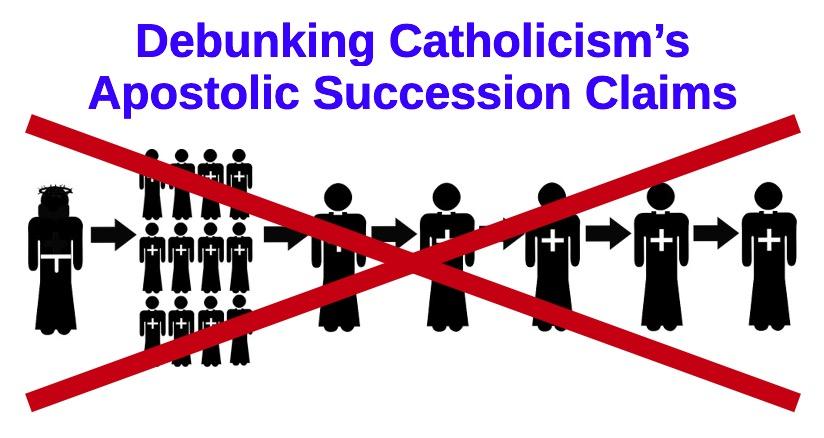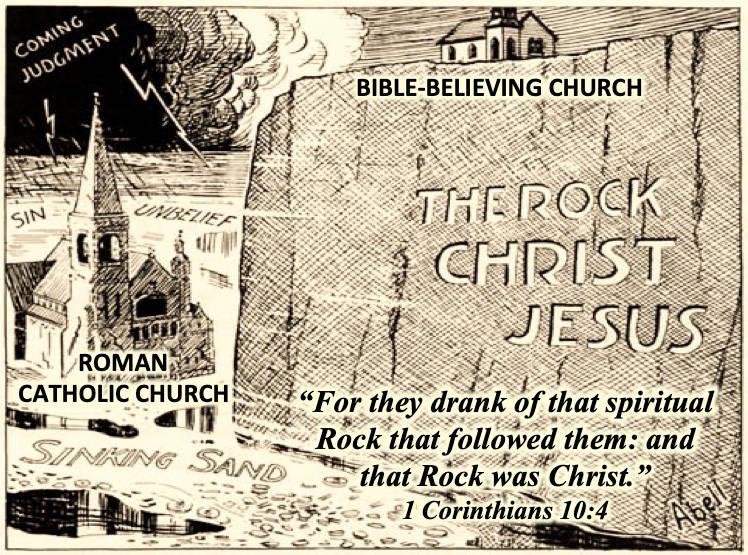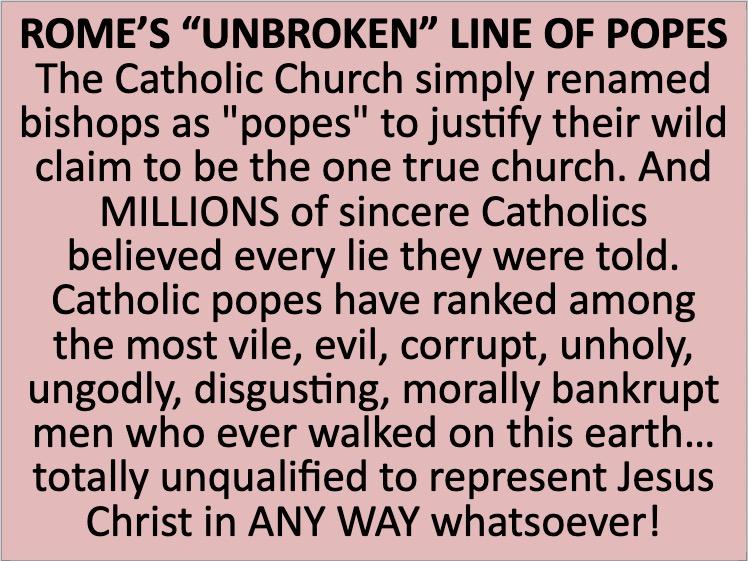False Catholic Church Teaching About Apostolic Succession
False Catholic Church Teaching About Apostolic Succession
And Their “Un-Broken” Line Of Popes

Introduction:
“Now therefore ye are no more strangers and foreigners, but fellowcitizens with the saints, and of the household of God; And are built upon the foundation of the apostles and prophets, Jesus Christ himself being the chief corner stone;” Ephesians 2:19-20
Here we are taking a look at the claim of the Catholic Church about how their entire line of popes is part of an unbroken chain of apostolic succession from the apostle Peter, whom the Catholic Church falsely claims was their first pope. Nowhere in the New Testament are any of the twelve apostles recorded as having passed on their apostolic authority to ANY successors. Nowhere do any of the apostles mention that they had any plans to pass on their apostolic authority. NO, Jesus ordained the apostles to build the foundation of the church (Eph. 2:20). And this is the one crucial issue that the Catholic Church appears to clueless about, and instead they focus on spreading their false stories about apostolic succession, rather than focusing on the FOUNDATION of the Church:
What exactly is the foundation of the Church (the true worldwide Christian Church, not the Catholic Church) that the apostles built?
The foundation of the Church is the New Testament – the record of the deeds and teachings of the apostles. Therefore, the true Church has no need for apostolic successors. The true Church needs the teachings of the apostles accurately recorded and preserved, as they have been. And that is exactly what God has provided in His holy inerrant Word (the Holy Bible). And our conclusions about this matter are repeated over and over again in the Bible:
“In whom ye also trusted, after that ye heard the word of truth, the gospel of your salvation: in whom also after that ye believed, ye were sealed with that holy Spirit of promise,” Ephesians 1:13
“For the hope which is laid up for you in heaven, whereof ye heard before in the word of the truth of the gospel;” Colossians 1:5
“Study to shew thyself approved unto God, a workman that needeth not to be ashamed, rightly dividing the word of truth.” 2 Timothy 2:15; 4:2
“Preach the word; be instant in season, out of season; reprove, rebuke, exhort with all long suffering and doctrine.” 2 Timothy 4:2
The way that the Catholic Church deceives their members about the issue of apostolic succession, is by claiming that every bishop of Rome who came along after the apostle Peter, was a pope. However, that is nothing more than one of many false CLAIMS that the Catholic Church uses to attempt to give legitimacy to their equally false claim of being the one true Church started by Jesus Christ. The early Church didn’t have some supreme leader (pontiff) running the entire Church from the city of Rome. There were bishops, pastors, elders and deacons local to every city and town where there were Christians. And that is still true today. There are no priests in the New Testament Church either, other than the worldwide body of Christ that is referred to as a “royal priesthood” in 1 Peter 2:9. The sacrificial priesthood was abolished at the cross of Calvary when Jesus cried out “It is finished!” and at which point the temple curtain was supernaturally split in two, thus symbolizing the direct access to God now provided by the ONE mediator between God and man, the Lord Jesus Christ (1 Timothy 2:5).
A closer look at the claim of unbroken line of popes:
Peter never had the title of pope while he walked the earth. That title was applied to him posthumously by the Catholic Church much later on. The official title of pope – as applied strictly to the successors of Peter – did not come into effect until Gregory VII who reigned as pope from 1073 to 1085. Nowhere in Scripture did Peter ever claim supremacy, status or authority over any of the other apostles. Nowhere in his epistles (1 and 2 Peter) did Peter ever claim any special role over the Church at large. And when we examine the New Testament, there is no mention of Peter or any other apostle having apostolic authority that would be passed on to any successors. While Peter had a leadership role among the disciples and while he played a major role in the early spread of the gospel, Peter himself pointed to the true Shepherd and Overseer of the church, the Lord Jesus Christ (1 Peter 2:25): “For ye were as sheep going astray; but are now returned unto the Shepherd and Bishop of your souls.”. Paul points to the true Shepherd as the head of the Church also, even going so far as to refer to the Lord Jesus Christ as the ROCK:
“And did all drink the same spiritual drink: for they drank of that spiritual Rock that followed them: and that Rock was Christ.” 1 Corinthians 10:4

None of the bishops of Rome claimed universal authority over the entire Church until the middle of the third century. In fact, in 325 AD at the Council of Nicea, the bishop of Rome was given authority over an area similar in scope to that of the bishop of Alexandria, who had authority over all of Egypt. Even Catholic historians will admit that the office of ruling bishop in Rome was not something that started while the apostle Peter was alive:
“To begin with, indeed, there was no ‘pope’, no bishop as such, for the church in Rome was slow to develop the office of chief presbyter, or bishop. By the end of the first century the loose pattern of Christian authority of the first generation of believers was giving way in many places to the more organised rule of a single bishop for each city, supported by a college of elders. …There is no sure way to settle on a date by which the office of ruling bishop had emerged in Rome, and so to name the first Pope, but the process was certainly complete by the time of Anicetus in the mid-150s”
— Eamon Duffy, a Roman Catholic Historian and former member of the Pontifical Historical Commission
Source: Saints & Sinners: A History of the Popes, (New Haven and London: Yale University Press, 2006), pp. 9-10, 13.
Summary:
There does not appear to be any historical evidence from 100 AD to 200 AD indicating that the early church had a pope, or papal system, or that one solitary man was the leader over the entire Church. The Pope, which simply means “father”, was not referred to in such a manner for centuries after the founding of a Christian church in Rome. The bishop of Rome (the leader of the local church in Rome) had no greater authority than the bishops of Ephesus, Philippi, Jerusalem, Pergamos, Sardis, Smyrna or any other major city. The bishop of Jerusalem was considered the high-ranking bishop, if anyone.
On top of all that, Catholics don’t even realize that they are not even members of the true Church that Jesus established. Theirs is a huge counterfeit of the true Church, a counterfeit that shares something in common with ALL false religions: a man-made, man-centered, works-righteousness plan of salvation, that denies the COMPLETENESS and EFFECTIVENESS of the work of salvation that the Lord Jesus Christ fully accomplished on the cross of Calvary, when He shed His precious blood as the Lamb of God who takes away the sins of the world. Salvation is found in the Lord Jesus Christ and His merits alone. All that a saved sinner (a true Christian) can do in response to receiving salvation through Christ is to live a life of thankful obedience to God. And that does NOT – and never will – involve bragging about being a member of the “one true Roman Catholic Church”. When it comes to salvation, the only thing that ANYONE on earth has the “right” to brag about is being a hell-deserving sinner, as we see so clearly pointed out here by the prophet Isaiah:
“Then said I, Woe is me! for I am undone; because I am a man of unclean lips, and I dwell in the midst of a people of unclean lips: for mine eyes have seen the King, the Lord of hosts.” Isaiah 6:5




















